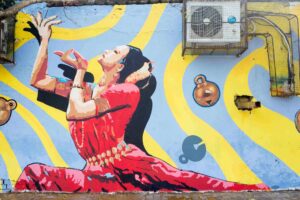Archives: Events
“Spirituality and Self-Care: Resisting Optimization through Womb Yoga”, by Carine Plancke
Self-care and spiritual wellbeing practices are increasingly shaped by neoliberal ideals of productivity. Yet when enacted as forms of radical self-love and self-recovery, they can also operate as sites of resistance. The webinar explores this tension through an ethnographic study of womb yoga, a women-centred alternative therapy developed in the UK.
Prof. Carine Plancke is Guest Professor in Gender and Diversity Studies and directs the Centre for Research on Culture & Gender at Ghent University. She holds a MA in Social and Cultural Anthropology (KU Leuven), a postgraduate in Women’s Studies (University of Antwerp.) and a PhD in Social and Cultural Anthropology (Ecole des hautes études en sciences sociales, Paris / KU Leuven.) She worked as a teaching and research fellow at the universities of Nice and Clermont-Ferrand, as a Fernand Braudel and a Marie Curie fellow at the University of Roehampton and as a FWO postdoctoral researcher at Ghent University. Her research areas are anthropology, gender, body practices, dance, performance, yoga, tantra, affect, ritual and creativity, contemporary spirituality, Central Africa, Western Europe.
This webinar is the first in 2026 webinar series “Care in Academia: An Interdisciplinary Perspective” , organized by the GRACE-ETN: Globalization, Religion and Culture Educational Thematic Network.
Registration: https://docs.google.com/forms/d/e/1FAIpQLScTejWlkpgpOcSrN11mFChTV5erQPlbT4BU6nzm_psK75E8HQ/viewform
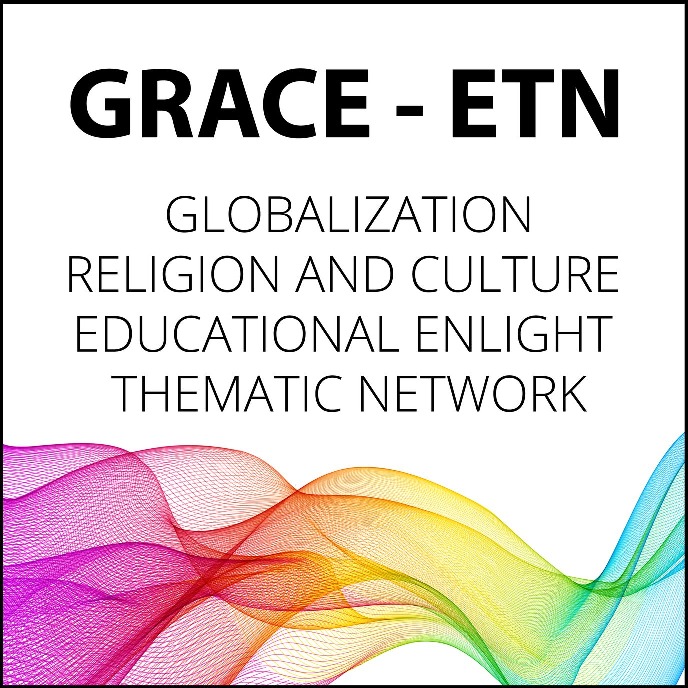
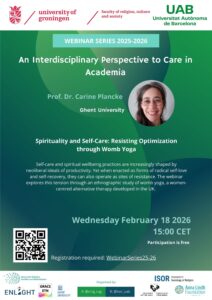
Threatened Bodies, Threatening Bodies: Gendered and Racialized Boundaries in the French School after the 2015 Attacks
During this lunch seminar, Lamia Mellal will present her research on post-2015 securitization policies in French schools. Her PhD, part of the project Deradicalizing the City, explores how post-attack security measures affect Muslim minorities across Europe. She conducted a year-long ethnography in two high schools in Marseille’s northern districts—areas heavily stigmatized and targeted by policies securing school infrastructures and monitoring students, especially those racialized as Muslim and framed as potential threats. Using collaborative methods, she worked with pupils through workshops producing podcasts and short films to examine their situated experiences. This presentation focuses on the gendered dimension of Islamophobia, particularly clothing restrictions on Muslim girls, and how these rules shape students’ resistance strategies within schools.
Lamia Mellal is a PhD candidate in Anthropology (KU Leuven) and Sociology (ULB). Her work focuses on Islamophobia in France and on the school as a site where ethno-racial discrimination is produced and reproduced. She is currently completing her dissertation within the research project Deradicalizing the City (FWO).
Registration for online participants:
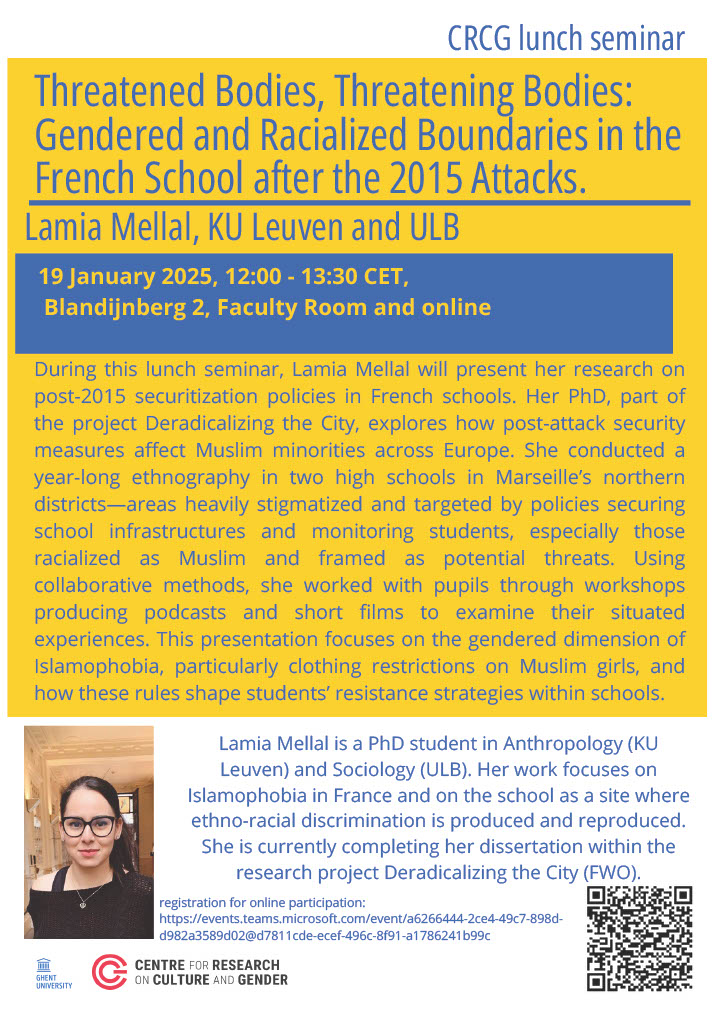
Lamia Kocaman: From Modern Couches to Cosmopolitan Villages: Migrant Women’s Transnational Home-Making Between Europe and Turkey
During this lunch seminar, Lamia Kocaman will present her research on transnational home-making between Europe and Turkey, focusing on amplifying women’s voices. Her work examines how migrant women actively shape their multiple homes across borders and negotiate multiple belongings. By analyzing both the processes and products of home-making, Kocaman explores how transnational houses challenge traditional, static notions of the home. These houses are both fixed in place and shaped by their connections elsewhere. Using a transnational framework, her research highlights the circulation of spatial knowledge, practices, and aesthetics between European cities (cities of residence Ghent and Stockholm) and Turkish towns (cities of origin: Emirdağ and Kulu). Through in-depth interviews and spatial mapping, Kocaman amplifies the voices of women who often remain underrepresented in architectural and urban studies. Her work intersects architecture, anthropology, and feminism, offering new insights into how migration impacts domestic spaces across borders and landscapes.
Lamia Kocaman is a PhD student in the Department of History, Theory, and Criticism of Architecture at KU Leuven. She is currently working on a dissertation titled Transnational Housing: A Spatial Analysis of the Processes and Products of Migrant Women’s Home-Making Between Europe and Turkey (supervised by Luce Beeckmans).

‘Was I not enough?’ Infidelity and the crisis of the self, by Simone Schneider
12.00h-13.30h, on-campus
Blandijn room 3.30 – Camelot (third floor) Campus Boekentoren, Blandijn Blandijnberg 2, Ghent University
In this lunch seminar, Simone Schneider will present her work on infidelity in intimate relationships, drawing on qualitative interviews with people in and around London who have personal experiences of cheating, relationship transgressions, and affairs.
What is it like when your partner cheats on you? How do people negotiate and manage this experience? In this presentation, Simone will focus on the accounts of those who have been cheated on or whose partner has had an affair. She argues that infidelity calls into question individuals’ sense of self and their (couple) identity, in particular, in light of contemporary ideas around choice, recognition, and (anticipated) stigma. Against this background, Simone examines the various forms of identity and recognition work that people engage in when dealing with infidelity. Namely, different narratives and strategies allow them to restore their sense of self, self-worth, and agency. Finally, she links this analysis to broader discussions on gender and sexual identity, the role of romantic relationships, as well as singularity and ordinariness.

Simone Schneider is a PhD student in the Department of Sociology at the University of Cambridge. Her research explores cultural and social processes in the realms of intimacy and sexuality. In her dissertation, Simone studies the meanings, norms, and practices of infidelity in intimate relationships.
Tuesday 16 September 2025
12h00 – 13h30
Join us in person, no registration required
Blandijn room 3.30 – Camelot (third floor)
Campus Boekentoren
Blandijn Blandijnberg 2
9000 Ghent
Dancing Hands – On Neurodivergent Embodied Knowledge by Anna Püschel and dr. Anja Veirman
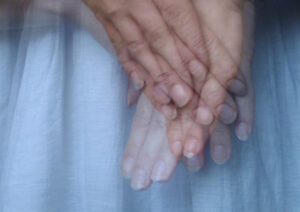
In the rather recent field of neurodivergent academic writing, the neurodiversity paradigm that treats neurodivergent individuals as equals and entitles them to telling their own story opens new pathways to understanding neurodiversity as a variation of human existence, and brings different ways of thinking-making-being into the discourse. Many authors in this still field choose auto-ethnographic approaches as their methodology in order to disrupt the fictitious dichotomy of normal and pathological, opening their experience to a larger audience and uncovering a sensuous world in constant movement. In her auto-ethnographic artistic research Stimming a Space, visual artist AnnaPüschel explores the entiry neurodivergent bodymind to approach accomodations through an embodied neurodivergent lens. She focuses on stimming (self-regulation) as a powerful tool to create safe spaces and presents it as a radical gesture of selfcare. Her research feeds into current decolonial discourses and serves as an invitation to dwell at the margins of the neurotypical universe.
Anja
Anja Veirman is an art historian/anthropologist who is active on the crossroads of textile studies, global art history and audio-visual ethnography. Onto-epistemologies, relations with the more-than-human, embodied knowledge and co-creation are central to her work.
Anna
Anna Püschel works with photography and texts. Within Fluid Futures, she explores stimming – soothing rhythmical movements – as a way to explore how creative practices can contribute to safer spaces for neurodivergent women in the art world.
LUCA School of Arts. KU Leuven, Gent.
Tuesday 10 June 2025
12h00 – 13h30
Join us in person
Faculteitszaal (first floor)
Campus Boekentoren, Blandijn
Blandijnberg 2
Ghent University
Directions
Organised by
CRCG – Centre for Research on Culture and Gender
Hair, Identity, Beauty, and the Self in Muslim Contexts: Emotional Landscapes and Changing Femininities Beyond the Veil, by Lisa Franke
Lisa Franke presents her project proposal submitted to the ERC on how Muslim women’s hair shapes everyday intimate lifeworlds, processes of social transformation, and new religious identities in contemporary Egypt, Lebanon and the United Arab Emirates. By shifting the paradigm from the veil as a marker of inter alia religiosity, the project examines how the attitudes and practices of Muslim women towards their hair condition religious norms and social expectations.
Hair itself remains a neglected theme, despite being central to issues of identity, beauty and processes of individualisation. Even so, there is much contention concerning how Muslim women wear their hair, think and feel about it. Indeed, hair is at the very root of the global contemporary headscarf debate. Hair is both a mundane issue and a disputed one for many women. As such, it is a contentious field that spans the negotiation of gender dynamics, beauty ideals, political orientation, and religious norms.
About the speaker
Lisa Maria Franke is research assistant professor in Islamic Studies at Ghent University in the Department of Languages and Cultures. Her research and teaching focus on the social and intellectual history of Islam and being Muslim in the modern Middle East.
Her research interests include everyday history, eschatology, faith and identity, discourse analysis and gender studies; individuality, religious transformation processes and social dynamics; modern Arabic literature; language as a form of mediation in various text forms. Read more
Register and attend online
Click here to register and join on Microsoft Teams

“Between revolution and capitulation: an ethnography of everyday queer worldmaking in the Chinese city Hangzhou” captures the everyday lives of queer people and their organizing practices in contemporary mainland China”. By Haiyan Huang.
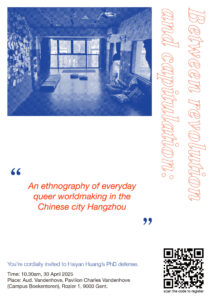
Quest for Love in Central Morocco – Young Women and the Dynamics of Intimate Lives – Laura Menin
Laura Menin’s ethnography focuses on young women living in the low-income and lower-middle-class neighborhoods of a midsized town in Central Morocco, far from the overt influence of city life. At the heart of the book, Menin draws upon ideas of “love” as an ethnographic object and source of theoretical examination.
She demonstrates that love, as a complex cultural and historical phenomenon shaped through intersecting socioeconomic and political developments, is crucial in thinking through generational changes and debates in Morocco and the Middle East more broadly. What is at stake in the quest for love, she argues, is not only the making of gendered selves and intimate relationships, but also the imagination of social and political life. Read more
About the speaker
Laura Menin is a research associate in the School of Global Studies at the University of Sussex. She has published numerous articles in the Middle East Journal of Culture and Communication, Contemporary Levant, and the Journal of the Royal Anthropological Institute.
29 April 2025
16h00 – 18h00 (GMT +1)
Join us in person
Auditorium 1 Jan Broeckx
Faculty of Arts
Blandijnberg 2
9000 Gent
Directions
This book presentation is part of the Middle East Studies Research Seminar Series
Organised by
Arabic, Islamic and Middle East Studies Middle East Studies at Ghent University
Co-organised by
CARAM – Centre for Anthropological Research on Affect and Materiality
CRCG – Centre for Research on Culture and Gender
CRCG Lunch seminar with Barbara Čurda: “Feminine Agency and Social Values in Shifting Urban Environments: The Transmission of Odissi dance in Bhubaneswar”
GCSAS – Ghent Centre for South Asian Studies
CRCG – Center for Research on Culture and Gender
Campus Boekentoren, Blandijn
Blandijnberg 2
Ghent University
